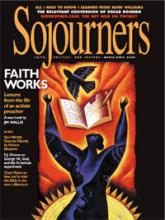At least twice a week for the past year, I’ve listened to one song by the great country-rock renegade, Steve Earle. The song is on his album El Corazon, and it’s called "Christmas in Washington." It was written on the eve of the second Clinton inaugural. As the singer watched the news of Democrats preparing "for four more years of things not getting worse," he experienced a cry of the heart that became the chorus of the song. "Come back Woody Guthrie, come back to us now. Tear your eyes from paradise and rise again somehow."
The second verse of the song recounts a younger Earle’s folkie devotion to Guthrie. In the third verse he returns to the present scene, singing, "The fox is in the henhouse now, the cow’s out in the corn. The unions have been busted, their proud red banners torn." Then the chorus returns, but this time it goes, "Come back Emma Goldman. Rise up old Joe Hill. The barricades are going up, and they cannot break our will." Every time I’ve heard that chorus I’ve experienced a familiar catch in the throat. It evokes the spirit and flesh of the old, wild America of the late 19th and early 20th centuries. A place where democracy was still considered an unfinished business.
In those days, a technological revolution had created great concentrations of private wealth and power called "corporations." Those entities impoverished millions of formerly self-sufficient farmers and artisans and ran roughshod over the lives of workers, families, and communities. In those days, workers and farmers fought those new economic powers, in the streets, and by any means necessary. When I heard Earle summon up those saints of struggle, I felt that old dream of a better world stirring in my chest again. Then that line about the barricades would always stop me cold. It seemed like a thin, false hope, driven more by nostalgia and the need for a rhyme, than by any assessment of political reality.
Read the Full Article
